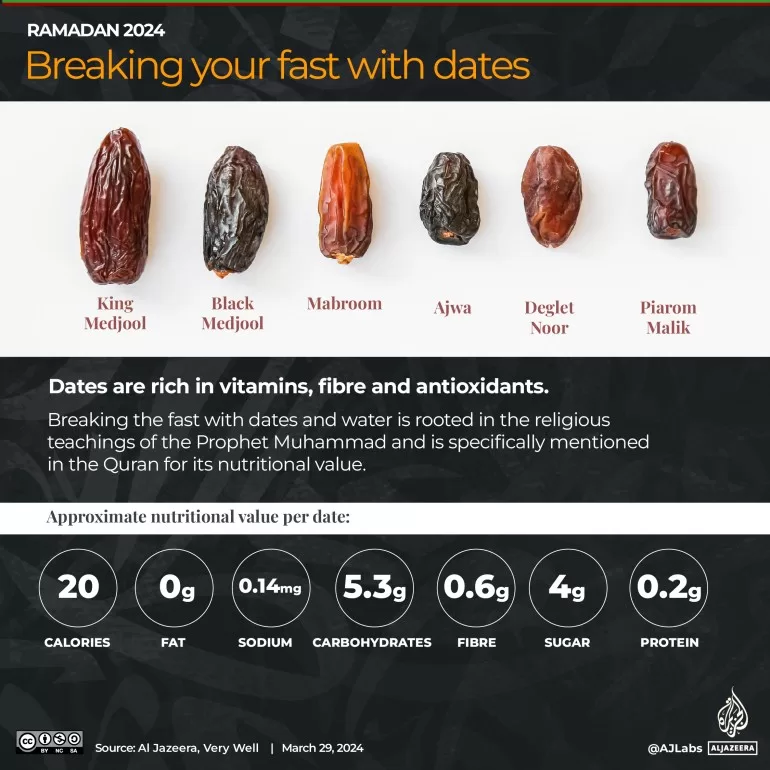During these 29 or 30 days, able-bodied, observant Muslims abstain from eating, drinking, smoking and sexual relations during daylight hours to achieve greater “taqwa”, or consciousness of God.
Breaking one’s fast with dates and water is rooted in the religious teachings of the Prophet Muhammad and is specifically mentioned in the Quran for its nutritional value.

Dates, fresh or dried, contain important vitamins, minerals and fibre. They are also high in antioxidants.
Given their high level of fructose, a natural sugar found in fruit, dates are a great source of energy, especially after a long day’s fast.
There are many different varieties of dates, each with different tastes and textures:
Medjool: known for their large size, sweet taste, amber colour and richness in flavour
Mabroom: less sweet than other kinds of dates with an elongated shape, reddish-brown hue and chewiness
Ajwa: have a soft, fleshy, almost juicy feel, are very sweet and are among the dates most revered by Muslims because they are grown in Medina, Saudi Arabia
Deglet Noor: medium-sized, lighter in colour and ideal for cooking and baking
Piarom: darker skin, rich flavour, slightly drier and known for their unique taste
Interesting facts about dates
Dates have been cultivated for thousands of years. Date palm trees are either male or female, and only the female plant produces fruit.
A mature date palm can produce more than 100kg (220lb) of dates per harvest season – about 10,000 dates.
The Ajwa date is the most expensive date in the world.

Top producers of dates
In 2022, according to Tridge, a food and agriculture database, about 10 billion kilogrammes (22 billion pounds) of dates were produced worldwide.
Dates tend to thrive in countries with long, hot summers like those in the Middle East and neighbouring regions.
Egypt is the world’s top date producer, producing nearly one in five, or 18 percent, of the world’s dates, according to Tridge.
Saudi Arabia follows at nearly 17 percent with Algeria rounding off the top three at 13 percent.
The infographic below shows where most of the world’s dates come from:

Boycotting Israeli dates
Israel is one of the world’s largest exporters of dates, selling $330m of medjool dates abroad in 2022, according to Tridge.
During Israel’s nearly six-month war on Gaza, which has killed more than 32,000 people, several groups have called for a boycott of Israel-related products.
One such group is the Boycott, Divestment and Sanctions Movement (BDS), a Palestinian-led initiative that seeks to challenge international support for what it calls Israeli apartheid and settler colonialism.
BDS has urged consumers to always check labels and not buy dates that are produced or packaged in Israel or its settlements in the occupied West Bank, which are illegal under international law.
They recommend avoiding the following brands:
- Hadiklaim and its brands: King Solomon, Jordan River and Jordan River Bio-Top
- Mehadrin
- MTex
- Edom
- Carmel
- AgrexcoArava

